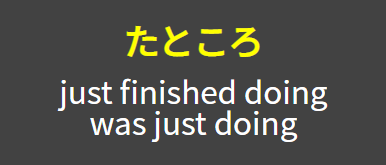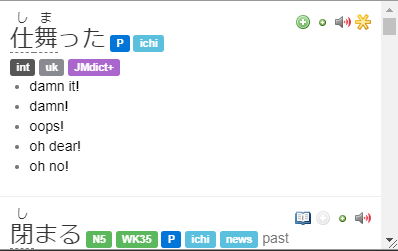just finished doing
was just doing
Structure
- Verb[ た ] + ところ
- Verb[ ていた ] + ところ

This grammar point contains the sentence
which confuses me each time. I would expect するところ here because the tea business is about to begin, not about to end, so I would expect the tense of the overall sentence to just come from the end (分かった)while I think the relative clause should just reflect the timing relative to the main clause.
Can anybody please help me understand why this sentence is correct as it is, and how the grammar point’s meaning “just finished doing” relates to it?
It’s using this grammar in combination with ようとする. Frankly I’ve also been confused by this combination multiple times, and I still have trouble breaking it down.
Also, ようとする is N3, so I think it’s inappropriate to use with this N4 grammar for an example sentence.
So, does that mean that したところ is in past tense because the trying-but-failing part (that is expressed via ようとする iirc) is already over when the person noticed the lack of teabags?
Wow, that sounds really convoluted.
Even if it were N4 as well, its usage in this sentence makes it unnecessarily hard for people who study grammar in non-Bunpro order…
One of the other meanings of ようとする is to be about to do something. So in combination with the "trying and failing " part you mentioned, I think that’s how you break down the meaning.
@Nicole @seanblue
Hey! 
Exactly.
This example will be (finally) changed since it uses higher level grammar. 
お茶を飲もうとしたところ(に)ティーバッグがないと分かった。
(飲もうとしたところ can be rephrased to 飲もうとしたら・飲もうとしたとき)
I was about to make a tea, I realized that I didn’t have tea bags.
In this case, there is already a nuance of it being disrupted in some way, and being displeased at it.
It means the same things as:
お茶を飲むところティーバッグがないと分かった。
But in this case, in 飲むところ there is no implied feeling of displeasure, being troubled. Plus, a Japanese speaker is more likely to use the first one.
飲もうとするところに is not really used
Thank you to both of you for breaking down the grammar for me! Now I can understand how this sentence comes about.
Can someone explain to me how the で fits in the sentence below as a particle?
I have spotted some other sentences which used it this way but I am not sure how it fits exactly.
According to Dictionary of Japanese Grammar, で can be used to indicate the time when s.t. terminates or the amount of time a period of activity has taken, which seems to fit well here.
Heya, I was wondering about the following sentence:
According to the grammar point, たところ itself can mean “just finished”.

So why is 終わる there?
Is the sentence literally implying that I just finished finishing my meal?
Or would 今食べたことろです imply the same thing?
(Furthermore, 今 combined with a past tense already implies the described part in the sentence “just” happened, so wouldn’t 食べたことろです suffice as well?)
@Pep95 Hey! 食べ終わったところ is close to the English “I just finished eating,” while 食べたところ is “I just ate.” It is just a matter of what you would like to express. They both mean essentially the same thing here. Cheers!
I think this review sentence is using grammar ahead of its lesson: [~てしまう]
旅行に行ったところに、台風が来てしまった。
Just as I had gone on a trip, a typhoon unfortunately came.
And as usual my 英和辞典 was more confusing than help full haha! xD

Hey 
Thank you for the feedback!
I have replaced all sentences that were using grammar points that appear later than たところ!
Cheers,
I don’t understand why this won’t accept 思っていたところ as an answer. The sample sentence uses a similar form.
Hey 
It was a bug and has been fixed thanks to your feedback.
Thank you and sorry for the inconvenience! 
I found this sentence in a JLPT N3 book and たとことdoesn’t seem to mean “just finished doing” in this case. What’s the meaning of this:
先輩に仕事をお願いしたとこと、気持ちよく引き受けてくれました。
@mrthuvi
Hey,
In this case (when AところB is used without any particle and B is generally in past form), it means “when/then” (the result of A is B/B has been triggered by A, but B happened by chance, not due to the will of the speaker). と and ったら can be used this way too.
Another example:
アプリを試したところ、エラーが出ました。
When I tried the app, I got an error.
B happened as a result of A, but was beyond the will of the speaker. Notice that actions of others are also beyond the will of the speaker.
I’m having trouble with differentiating ていたところ and ながら。 In the example sentence:
服を脱いでいたところに、母が部屋に入ってきた is translated as:
My mom came into the room just as I was taking my clothes off.
This seems to indicate the action is ongoing, rather than just completed. Why can’t I use ながら here?
Thanks!!
Larry
EDIT: corrected grammatical mistake regarding ながら
Your example sentence means explicitly at the moment you got undressed your mum entered (lol). It does not mean that at some point during the time it took you to get undressed she entered.
服を脱 いでいたところ に、母が部屋に入ってきた
My mum entered at just the moment I was getting undressed.
服を脱 ぎながら、母が部屋に入ってきた
My mum entered while she was getting undressed. ながら always refers to the same subject for both clauses.
たところ means precisely at the same moment as A, B happened.
ながら means that at some undefined point during A, B also happened. Must be the same subject for both clauses.
39, @nekoyama